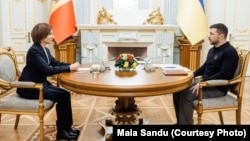The summer was full of speculation and hints from Brussels officials that Ukraine and Moldova might be separated on their respective paths to eventual EU membership.
The two Eastern European countries have been paired ever since both applied for membership of the bloc in the wake of Russia's full-scale invasion of Ukraine in early 2022.
They both got EU candidate status simultaneously in the summer that same year, and in late 2023 EU member states signaled to both that accession talks could start.
But the fact remains that these talks haven't started with either of them -- and that has to do with Hungary blocking the entire process with Ukraine over what Budapest sees as Kyiv's discrimination of the Hungarian minority in Ukraine.
The Central European country held a consultative referendum earlier this year in which 95 percent of the respondents were against Ukrainian EU membership.
While most other EU member states dismissed this vote as another political stunt by Budapest, few think the country is willing to lift its veto to start the talks any time soon.
And some think this is unfair to Moldova, as none of the 27 EU member states have anything against commencing negotiations with Chisinau.
The EU enlargement commissioner, Marta Kos, opened up on the idea of a formal decoupling when speaking to RFE/RL this spring and the idea seemed to gain traction over the summer when Brussels briefly was rattled by President Volodymyr Zelenskyy's sudden move in July to limit the independence of two key anti-corruption agencies.
The fact is that these sort of political "decouplings" have happened before, most recently last year as Albania was allowed to move forward with membership negotiations while Bulgaria has continued to veto the same steps for its neighbor North Macedonia.
But when the bloc's Europe ministers, which deal with enlargement issues, met in Denmark on September 1-2 there were no words about decoupling Moldova and Ukraine other than it was ruled out -- at least for now.
Reasons To Reject Decoupling
The reason for this is threefold: a recognition not to give in to what many member states see as Hungarian blackmailing, a feeling that such a move would be strategically disadvantageous for both the EU and Ukraine right now, and that it would have limited impact on Moldova anyway.
On the first issue, there is an increasing frustration that Budapest is trying to dictate too much of the EU's policy toward Ukraine already.
And it is fair to say that the country has been successful.
EU institutional funding, via the European Peace Facility (EPF), for Ukrainian weapons has been blocked for two years already and later this week European diplomats will most likely accept that Budapest -- together with Bratislava -- will manage to remove some oligarchs from the bloc's Russia sanctions blacklist in order to achieve unanimity for a six-month extension of all the restrictive measures.
The thinking here is very much that rather than handing Hungary another win, it could be wise to wait until the Hungarian parliamentary election in April 2026 with polls showing that the opposition has a real chance of seizing power.
This would not automatically mean a total reversal of Hungary's Ukraine policy, but few EU officials think while Ukraine is losing precious time, a few more months of waiting is insignificant in a bigger process that can drag on for years or possibly decades.
Secondly, many of Ukraine's most ardent supporters in the club such as the Baltic states and the Czech Republic immediately started a diplomatic rearguard action against any type of decoupling as soon as rumors started spreading that it was considered.
Lithuania authored a discussion paper, seen by RFE/RL, in which it argued that EU-26, meaning the entire club bar Hungary, should conduct informal negotiations with both Ukraine and Moldova in the meantime and that negotiations on most of the 33 accession chapters would be opened "in a fast-track manner when EU-27 support is rebuilt."
Crucially, both France and Germany, the two EU heavyweights, came onboard against any decoupling now especially as the United States has signaled that Ukrainian NATO membership most likely is off the table in any potential future peace negotiation with Russia.
In this sense, EU membership for Kyiv becomes even more pertinent according to most EU diplomats who see this as the most obvious political and security guarantee that European nations can offer the war-torn nation going forward.
Moldova Against Decoupling -- For Now
Finally, there were also signals from Moldova that even Chisinau wasn't too keen on decoupling, at least now.
Many European officials had wanted to give the country's pro-EU government a boost ahead of what is expected to be a closely fought parliamentary election on September 28 by opening accession talks a few days or weeks before the vote.
Yet, others, both in EU capitals and in Chisinau, argued that this would have a limited outcome anyway for two reasons.
Firstly, few beyond the corridors of power in Brussels understand the technicalities or the significance of starting EU accession negotiations.
As one EU diplomat put it to me: "People want to know when their country can join and what it means for them, not when some obscure diplomats meet."
Secondly, there is a recognition among all EU candidate countries, but notably Moldova , that it is Ukraine and its efforts to fight off the Russian invasion that has reignited EU enlargement in general.
Chisinau in fact jumped on the coattails of Ukraine in applying for EU membership back in 2022. For now, they will remain connected, but don't rule out that the decoupling debate might start again later in the year.












